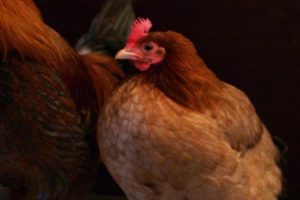 Arlington County’s Urban Agriculture Task Force presented its recommendations to the Arlington County Board on Tuesday night. Chief among them: allow backyard hens for residential egg production, but only in larger yards and with prior approval of neighbors and county inspectors.
Arlington County’s Urban Agriculture Task Force presented its recommendations to the Arlington County Board on Tuesday night. Chief among them: allow backyard hens for residential egg production, but only in larger yards and with prior approval of neighbors and county inspectors.
The 18-person task force has labored for more than a year to create the recommendations, contained in a 74-page report. Along the way, the task force conducted extensive public outreach online, at farmers markets and at community meetings.
In the end, on the hot-button issue of hen raising, the task force recommended a course of action unlikely to fully satisfy those on either side of the argument. Backyard hens, the task force said, should be allowed under the following conditions:
- Maximum of 4 hens
- No roosters
- Set back at least 20 feet from property lines
- Must file plans for coop and its placement
- Majority of adjacent property holders (within 50 feet of the coop) must consent
- Coop inspection required before occupancy
Task force chairman John Vihstadt — who acknowledged that “this is a very emotional issue stirring strong feelings on both sides” – described the recommendation as a reasonable compromise between those who wanted less hen regulation and those who wanted backyard hens to be prohibited. Currently, Arlington residents are technically allowed to raise poultry, but only if the enclosure is a full 100 feet from property lines. Reducing that to 20 feet is intended to allow more residents to raise hens while keeping disruption to neighbors to a minimum.
 In a minority report, several task force members argued that 20 feet “would actually allow very few properties in Arlington to keep hens.” The minority report suggested a 7 foot setback, and also suggested allowing residents to keep miniature goats on their properties.
In a minority report, several task force members argued that 20 feet “would actually allow very few properties in Arlington to keep hens.” The minority report suggested a 7 foot setback, and also suggested allowing residents to keep miniature goats on their properties.
Backyards Not Barnyards, a group formed to opposed backyard hen raising in Arlington, expressed skepticism about the task force’s recommendations. The group questioned which county agency would be responsible for “chicken checking,” and asked whether those who live next to hen coops will be expected to become the “poultry police.”
“What happens if hen-owners don’t follow the guidelines?” the group said in a statement. “Do they get their chicken licenses revoked? Who would revoke them? What happens to the chickens? What’s the fine for too much accumulated chicken poop?”
The County Board is not expected to take action on the the task force’s recommendations until later this fall.
The task force made a number of other recommendations to the Board on the topic of urban agriculture. Those recommendations included:
- Appoint a standing Commission on Urban Agriculture
- Integrate urban agriculture into county planning documents
- Create new community gardens and urban farms, utilizing rooftops and fallow land awaiting development if possible
- Permitting federal SNAP benefits (food stamps) at all Arlington famers markets (currently only a couple accept SNAP)
- Encourage the establishment of a “local food hub” to match up residential food producers with distributors and consumers
- Encourage the creation of additional Community Supported Agriculture (CSA) programs
- Support additional healthy eating and urban agriculture education in schools and libraries
- Repurpose the historic Reeves farmhouse as a center for urban agriculture education for Arlington school students
- Establish a municipal composting system
Another recommendation was the creation of a year-round covered farmers market, like Eastern Market in D.C. and the Pike Place Market in Seattle. Such a market could also hold cooking and nutrition classes, a task force member said. While intrigued, some Board members seemed skeptical about finding the right location and the funding for such a market.
One suggestion from a task force member drew the ire of County Board member Chris Zimmerman. Task force member Rosemary Ciotti suggested that the county could grant bonus density — larger buildings than zoning otherwise allows for — to developers in exchange for rooftop gardens or contributions to other urban agriculture projects. Zimmerman in turn warned against letting bonus density “be the answer to everything.”
“Density is not an infinitely mint-able currency,” he said. “We have flooded the market with density, and we have a big menu of things [like affordable housing] we’d like to buy with it already. We need to start discouraging people from thinking density is a tool… I’m suggesting that it’s not a tool [for urban agriculture], no matter worthy of a goal it us.”
“We’re probably not in the kind of market where that’s going to be very effective anyway,” Zimmerman added. “We’re past that being a viable option.”
 On a lighter note, the work session was filled with urban agriculture-themed puns.
On a lighter note, the work session was filled with urban agriculture-themed puns.
“Your task force took ‘eggstra’ care to ensure that all issues were carefully examined before any chickens come home to roost,” said one PowerPoint slide.
“Hopefully your effort will bear fruit,” said County Board Chair Walter Tejada.
“I look forward to a lot of fertile conversation,” said County Manager Barbara Donnellan.
Donnellan will now work with county staff to turn the task force’s report in to a proposal for the County Board.
“Issues surrounding healthy and sustainable food production, distribution, consumption and disposal impact the lives and livelihoods of Arlingtonians as never before,” task force chairman Vihstadt said in a county press release. “We have tapped the views and expertise of the local community in crafting a range of proposals and look forward to continued citizen engagement on these and other urban agriculture initiatives in the months ahead.”







